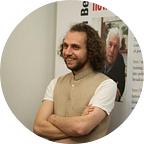Clarity for Teachers: Day 16
‘Praise and fame make you less clear. Ignore them.’
Today’s card stirs bad memories. I’ve never been famous, but I’ve had tiny homeopathic doses of something like it, and mostly it makes me shiver to think about them. The experience of reading an article where someone who hardly knows you is telling thousands of people you’ll never meet a story about who you are.
There’s something here that’s tangled up with writing, anyway: the way the published word works as a one-way mirror. I think of the writers whose words were lifelines to me as a teenager. Later, I started to come into contact with some of those writers, and I remember writing to one of them about this asymmetry: how someone’s words can have moved you to the edge of yourself, without them even being aware of your existence. It’s delicate, this; like being a teenager in love with someone you haven’t even plucked up the courage to speak to.
Until a hundred years ago, all the words that you would hear in a lifetime were spoken by people who could see that you were there, who could hear you, if you spoke back. (And yes, the cost of speaking back might silence you — but that’s another story.) Today, most of the words you hear in a lifetime come through machines, and most of these are the voices of people you will never meet, who will never know that you existed. It’s one of those quiet changes in what it’s like to be human that is rarely acknowledged.
When Twitter came along, part of what was startling was the way it let everyone talk back to each other. Suddenly, a celebrity could hear your voice. I was an early adopter — ten years ago, if you Googled “beginners guide to Twitter”, you’d find a blogpost of mine among the top results — and in the end I left because of the dizzying, disorienting effects of that source of attention. Now I find quieter ways to write and share my words.
‘A lot of us are out there looking for 30 million followers on YouTube because we didn’t have thirty people who showed us that we mattered when we were children.’ That’s another piece of wisdom from Martin Shaw. It makes me think how lucky I was as a child, because I grew up in the middle of a church, and a church can be a lot like a village: a human-scale community of grown-ups who show you that you matter.
‘I no longer seek my accountability from strangers,’ writes Richard Bartlett, and I say ‘Amen’ to that. The stories that are told about you by people who hardly know you — ignore them, says today’s advice. Don’t look for affirmation from what people say about your work. Learn to put your attention elsewhere, to live without needing these things.
I’ll admit, there are days when this feels like a work in progress. I don’t always know how to reconcile this with the asymmetry of writing and publishing — the desire to bring words into the world in a way that meets a deep hunger in others. Except that, if my words are to be capable of serving as a lifeline, the way that I found a lifeline in the work of certain writers when I was young, then that line needs to hold, it needs to be secured as solidly as I know how, in what I have found to be trustworthy. And as soon as I think about that, I know that things like praise and fame have no part in the work I’m doing.
Västerås, 20 March, 2020
This is the sixteenth in a series of commentaries on ‘A teacher’s advice on how to be clear’, Charlie Davies’s reworking of the 1000-year-old Buddhist text, ‘Advice from Atisha’s Heart’. I’m writing these as I take part in Clarity for Teachers, a course that Charlie is leading. You can find out more on the How To Be Clear website.
